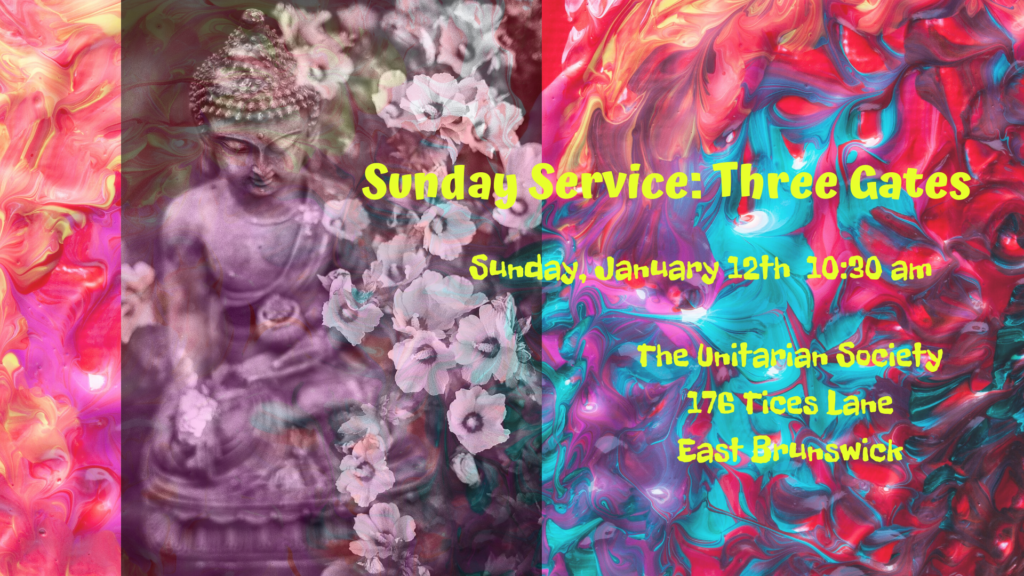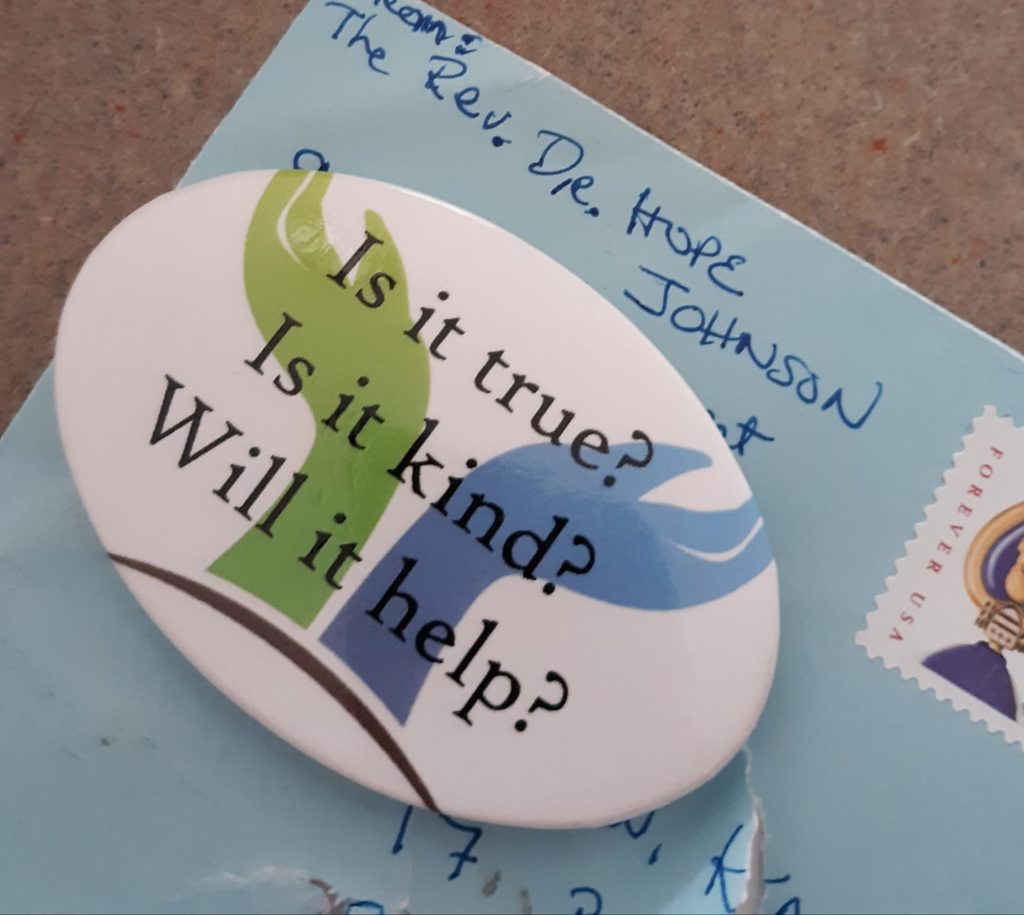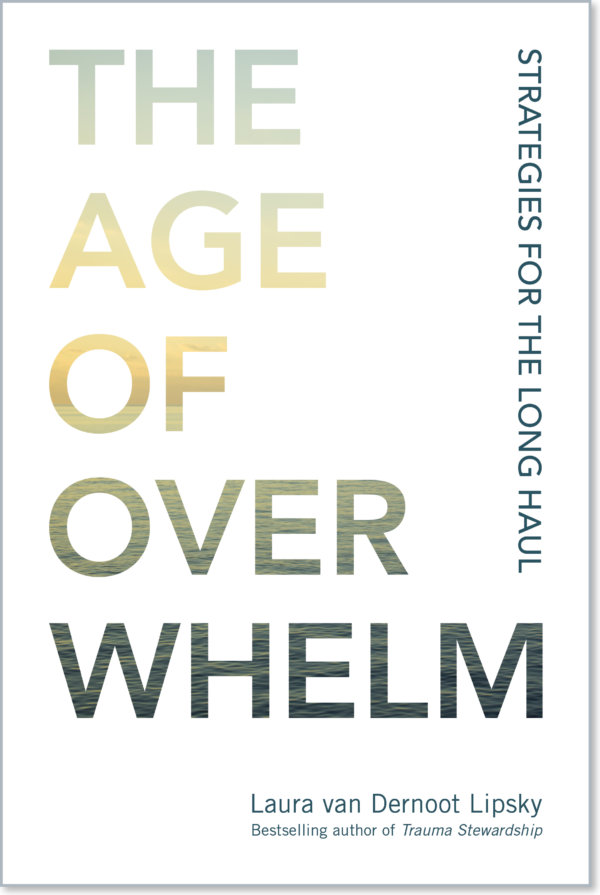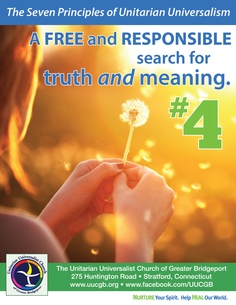The Unitarian Society, East Brunswick, NJ
January 12, 2020

John Woolman, a New Jersey Quaker from before the Revolution, is most-known for seeing abolitionist values among the Quakers. It is also from him that the concept of “right relationship” comes, calling on humans to live in right relationship with all creation. In a nod to our Soul Matters theme for this month, integrity, as well as next month’s (resilience), modern day Quakers Peter Brown and Geoffrey Garver tell us,
“A thing is right when it preserves the integrity, resilience, and beauty of the commonwealth of life and wrong when it does otherwise.”[i]
While our story from this morning comes from the Quaker tradition, the ever-unreliable internet also says it comes from Socrates. It’s hard these days to know what is fake news.
That concept of right relationship belong to all humanity, which has always yearned to do right by each other, even when there are more than enough examples of the opposite. Humans have sought, and continue to seek, a workable combination of freedom and limitations, what one might call rules, even if we choose to disregard, or even to break, them.
Some of these are BIG RULES, like the ten commandments from Judaism and adopted by Christianity. There is the Tao Te Ching with its long list of virtues, which might be considered rules for living virtuously. Along Buddhism’s Eight-Fold Path are suggestions for how to live ethically in the world, with instruction about right understanding, right thought, right speech, right conduct, right livelihood, right effort, right mindfulness, and right concentration.
Then there are small rules, or considerations, for how we might build a better world, perhaps even build Beloved Community. Or at least become a better person. Today I’ll be focusing on, to borrow Buddhism’s phrase, the right speech. How do we use our words responsibly and well?
Let’s start with the concept behind that Quaker story, which is called by the Three Gates. It seems to come to the world from the mystical side of Islam – the Sufis — though it has become so ubiquitous and widely adopted, it’s not easy to trace its actual origins. The Three Gates are three questions:
Is it true?
Is it necessary?
Is it kind?
There is a simplistic poem from the Victorian era, written by Beth Day in 1835, with the subtitle “After the Arabian”[ii]:
If you are tempted to reveal
A tale to you someone has told
About another, make it pass,
Before you speak, three gates of gold.
These narrow gates: First, “Is it true?”
Then, “Is it needful?” In your mind
Give truthful answer. And the next
Is last and narrowest, “Is it kind?”
And if to reach your lips at last
It passes through these gateways three,
Then you may tell the tale, nor fear
What the result of speech may be.
There are many who attribute these three questions to the Buddha, though the perfectly wonderful and well-researched web site, Fake Buddha Quotes (#BuddhadidNOTsaythat), assures us that the Three Gates or Sieves or Funnels – whatever you call it — did not come from the Buddha, no matter what the pretty meme on Facebook says. The Buddha had four – or five, depending on which sutta you look at – rules for right speech. Inclusive of the three gates, with more[iii].
~~~
Oh! That life, and decisions, were so easy that all we needed to do was ask three (or even four) questions and the answers we received would be clear and incontrovertible, not subject to disagreement or subjectivity!
Interesting, for here the order of the gates is different than what I first found in my travels to write this sermon, which shared truth as the first gate and changed to order of kind and necessary. Or of this button, which arrived in the mail yesterday, sent to me by a colleague who heard I was preaching on this topic. It turns out that at some point in the not far past, there was a minor movement in our denomination that resulted in many of these buttons being spread far and wide. They are lovely, but slightly different than the three gates, stating: Is it true? Is it kind? Is it helpful? Which is a bit different than necessary – more proactive, in my estimation.

Here’s a question that dogs me about this guidance – are all three gates of equal import? Do they co-exist on an egalitarian plane? Or is there some hierarchy, with one being fundamental, thus always the first gate by which to parse one’s words?
I have more questions. First, what are the definitions of true, kind, necessary? Who decides?
Is the definition of what is true, or what is kind, or what is necessary strictly personal and subjective – each of us decides for our own selves? Is it covenantal, which is to say, a community-based definition? Is it possible that there is some absolute, universal definition that works at all times, in all contexts?
For instance. there are things I know to be true now, yet I did not know them to be true twenty years ago. Others did. My own maturity, and my social location, with its privileges and marginalized identities, impact this greatly…as do yours. My true experience as a white kid of Safety Officer Joe in elementary school is very different than the true experience of Eric Garner, a Black man murdered by a police officer who used excessive force.
How about kindness? This, too, is both subjective, not only in that one’s intention can be different than impact, but also one’s own judgement of a thing that is kind can change over time. Parents know this when we set limits on our children – they don’t think we are doing them a favor. Yet, most of the time, by the time they grow up, there is a sense that what we did was beneficial, was kind.
And necessity? That’s another one where one person in the equation might not ever agree that it is necessary, but another – perhaps the person speaking up on behalf of their own humanity – knows that it is true, that is a kindness to self, and that it is utterly necessary to speak up and say a thing that might make everyone else in the room uncomfortable.
Another question. Or point of reflection. I wonder about the role of silence, of what happens when we decide not to speak. Silence, too, can be unkind, or unhelpful. Our silence becomes complicit with untruth, when silence is avoidance of hard necessities.
“A thing is right when it preserves the integrity, resilience, and beauty of the commonwealth of life and wrong when it does otherwise.”
Laura van Dernoot Lipsky wrote in her book, The Age of Overwhelm: Strategies for the Long Haul, the following:
There is merit in remembering that there can be a tension among the choices we make. There may be internal and external consequences. We may choose to do something that may mitigate consequences. We may choose to do something that may mitigate internal harm, but that, of course, doesn’t mean others will agree or understand or even respect our decisions.
Which is another way of saying, we might not all agree on what constitutes kind or necessary, or even true. van Dernoot Lipsky’s response to this conundrum?

In these times, it can be helpful to take the long view. Don’t watch the ripples on the surface of the water; watch the still depths.
But why listen to her? She asks us to grow comfort with tension, and that’s hard. So, why don’t we live by the wisdom of the 1970s heavy metal rocker, Meatloaf, and consider that “two out of three ain’t bad?”
That still leaves us with two. Which may make life a little bit easier. Maybe.
~~~
So, if all these different traditions, faith or secular, have these different takes on right speech, what does Unitarian Universalism have to say? Do the Principles give us some idea of how to live into our best selves when it comes to our covenanted community? Or when we spend the holidays with our in-laws? Or when we are online and deciding whether to respond to a social media post? Or when we have to deal with that annoying co-worker who won’t stop with the xenophobic or transphobic pronouncements?
The 4th Principle can be invited to be our companion, along with all the gates and sieves and funnels, no matter their order. The Fourth Principle names the free and responsible search for truth and meaning, which I propose are our UU gates: the qualities of “free” and “responsible.”

There is creative tension between free and responsible. I think of it as the creative tension between the individual (who wants to freely be themselves fully) and the community (be that a partnership, a family, a covenanted community, Beloved community, or the whole interdependent web of all existence of which we are a part) – which requires different levels of conformity to be coherent. Free means that I (or my group) do not lose my humanity to conformity. Responsible means that I do not, by intention or impact, demean or threaten the humanity of others, individual or group. Free means I have agency to enter into a covenant. Responsible means that I sometimes place the needs of the community ahead of my own. Using these as our gates raises these questions:
Are my words spoken freely, so that I am honoring my reality and the reality of those groups and peoples who claim me and I claim them?
Are my words spoken responsibly, so that from whatever my social location, from the intersection of my particular mix of privilege and marginalization, they are responsible not only to me, but to others with whom I am in relationship, or aspire to be?
These two additional gates greatly enrich the discernment process around right speech. Because, what if being kind necessitates, from one perspective or another, that you subvert an important part of yourself, collude with making invisible some aspect of yourself that others actively, intentionally erase, refuse to acknowledge? This is untenable in the long run.
Or it may not be kind to remind someone in public that they are misgendering you, but it may be necessary for your own dignity. And for them to live more fully into the First Principle, which affirms the dignity of all. This is where that tension comes into play. This is where learning to sit with the discomfort of tension is a key capacity for living a well-rounded human life.
I do want to say, because I think it’s important, especially as we talk about those the gate of kindness, that we confuse kind with nice far too often. Frankly, as people of conscience and faith, with ethics to draw us, and the call to make a more inclusive world, we often have to choose a fierce kindness over a limp niceness.
That said, I like the interpretations of this gate that suggest that once you have determined that something is true, the kindness gate requires you to do it as kindly as possible, which exists on a continuum. That might means saying what you have to say in private, to help save someone from embarrassment. It may mean waiting until any of our own anger or self-righteousness has ebbed, so we can offer our words in an unattached way, letting the other person accept it if they will, letting them drop it if they choose.
Sometimes, the kind way to say a thing is to say it publicly because the kindness is not to the person who said the mean or hateful or racist thing, but is to others who are watching or listening – others who need to hear that as a white person, you don’t condone racist behavior; others who need to hear that you don’t share a fear of a transgender person using the same restroom; perhaps it’s youth in the room, or even your own heart, that needs to hear that you won’t abide by fat-shaming or slut-shaming. I think about this often when I am trying to pass my words through the gate of kindness – kind to whom?
~~~
Which is more important? Truth? Kindness? Necessity? Freedom? Responsibility? I can’t answer that for you. I do believe that they live in a synergistic relationship with each other. It was probably not kind, the other day, when I spoke the truth that on the East Brunswick interfaith clergy council, we do not agree about the inherent problem of homophobia, but it was necessary. And I believe that I was being responsible with regard to how I represent this congregation, and our Unitarian Universalist values.
This is the thing: there’s no simple formula that will save you from being awkward, or clumsy, or from making mistakes, or from causing harm. No formula that will ensure your good intentions will always have beneficial impact. Life is much messier than that. To live a life of integrity means getting it wrong sometimes, it’s a dance, it’s an art not a science, it’s an approximation. It’s when we choose to enter into that dance that the tension of messing it up can become creative tension, which offers the chance of deep connection and robust covenanted community.
I encourage all of us, as Unitarian Universalists, to use both touch stones of free speech and responsible speech, free action and responsible action, free belief and responsible belief – not one or the other, but both in relationship, in regular check-in with one another, informed not just by our own most excellent thoughts, but also with reality checks from others with whom we are in relationship with, with others with whom we are in covenanted relationship, whom we choose as primary in our short and precious lives.
“A thing is right when it preserves the integrity, resilience, and beauty of the commonwealth of life and wrong when it does otherwise.”
Amen. Blessed be.
[i] Right Relationship Building A Whole Earth Economy by Peter Brown & Geoffrey Garver; thank you to Lara Campbell for this reference/citation
[ii] https://www.dailykos.com/stories/2012/5/23/1092850/-Is-it-true-Is-it-kind-Is-it-necessary
[iii] [iii] https://fakebuddhaquotes.com/if-you-propose-to-speak-always-ask-yourself-is-it-true-is-it-necessary-is-it-kind/: speak at the right time; the truth; with affection; beneficially; with good intention